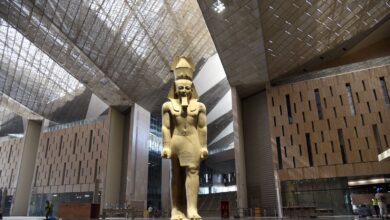The floods in Sinai and Aswan, which have claimed more then ten lives, continue to dominate the news today, with updates on the story appearing on the front page of most major newspapers.
State-run Al-Ahram, which normally tows a pro-government line, uncharacteristically lead with the headline "Dozens demonstrate in North Sinai demanding compensation for flood damages." Al-Ahram’s lead story favored a lighthearted approach to the crisis, with a photo of a woman attempting to bail out her home with a plastic cup. The front-page story elaborated on the small demonstration held by locals in North Sinai calling for compensation for damage to their businesses and the loss of their inventories and personal possessions.
Al-Ahram also addressed the possibility of a new wave of floods, which some are predicting will hit Egypt within two weeks, as well as the government’s plans to effectively protect citizens in Upper Egypt by diverting flood waters. A state of emergency has been declared in Qena governorate, according to Al-Ahram.
Al-Ahram also reported on the visit by Foreign Minister Ahmed Abul Gheit and intelligence chief Omar Sulieman’s to Sanaa, Yemen, to meet with Yemeni president Ali Abdullah Saleh. President Saleh praised "Egypt’s support in helping Yemen face all challenges that threaten its unity, security and stability," according to Al-Ahram. Abul Gheit confirmed Egypt’s position, offering Yemen political and moral support, and affirming Egypt’s readiness to provide financial support if necessary.
Egypt’s support for Yemen also dominated the headlines in pro-government Al-Akhbar, which ran with the headline, "Egypt confirms its full support of Yemen and calls for a lack of interference in its affairs."
Al-Akhbar‘s front page story reiterated Egypt’s unconditional support for Yemen in the form of a special message sent to President Saleh from President Hosni Mubarak by Sulieman and Abul Gheit. The story also stated that Egypt will not waver from its position in the upcoming London conference, where it will stand opposed to any impingement on Yemen’s soverignty and its right to control its own affairs.
In a more unsettling report, also featured on Al-Akhbar’s front page, Shura Council Speaker Safwat el-Sherif, in his capacity as head of the Higher Council for Journalists, called on thinkers, writers, preachers, and educators to "consolidate and publish the beliefs and values of citizenship… in respect of the rule of law which rises above individuals."
El-Sherif’s request was in response to the shooting in Naga Hammadi on Coptic Christmas eve, according to Al-Akhbar. The speaker called on the council to "address any attempts to threaten national unity," and all media outlets to "assume their position as a shield that protects citizens’ consciousness and unites the ranks that others may try to divide."
In the same conference, the Higher Council for Journalists declared the independent daily newspaper Al-Shorouq as "the newspaper most keen on protecting national unity." Al-Shorouq ran the news on its front page.
In a report issued by the journalistic practices committee of the council, and announced by el-Sherif, Al-Shorouq was praised as "the most notable national, independent or opposition newspaper that is committed to accuracy, objectivity, and reliance on primary and trusted sources," according to Al-Shorouq. The praise was in reference to the newspaper’s coverage of the Naga Hammadi shooting, and the report made special mention of the "importance" of Salama Ahmed Salama’s 13 January column titled "He’s Coptic, so why are you angry?"




